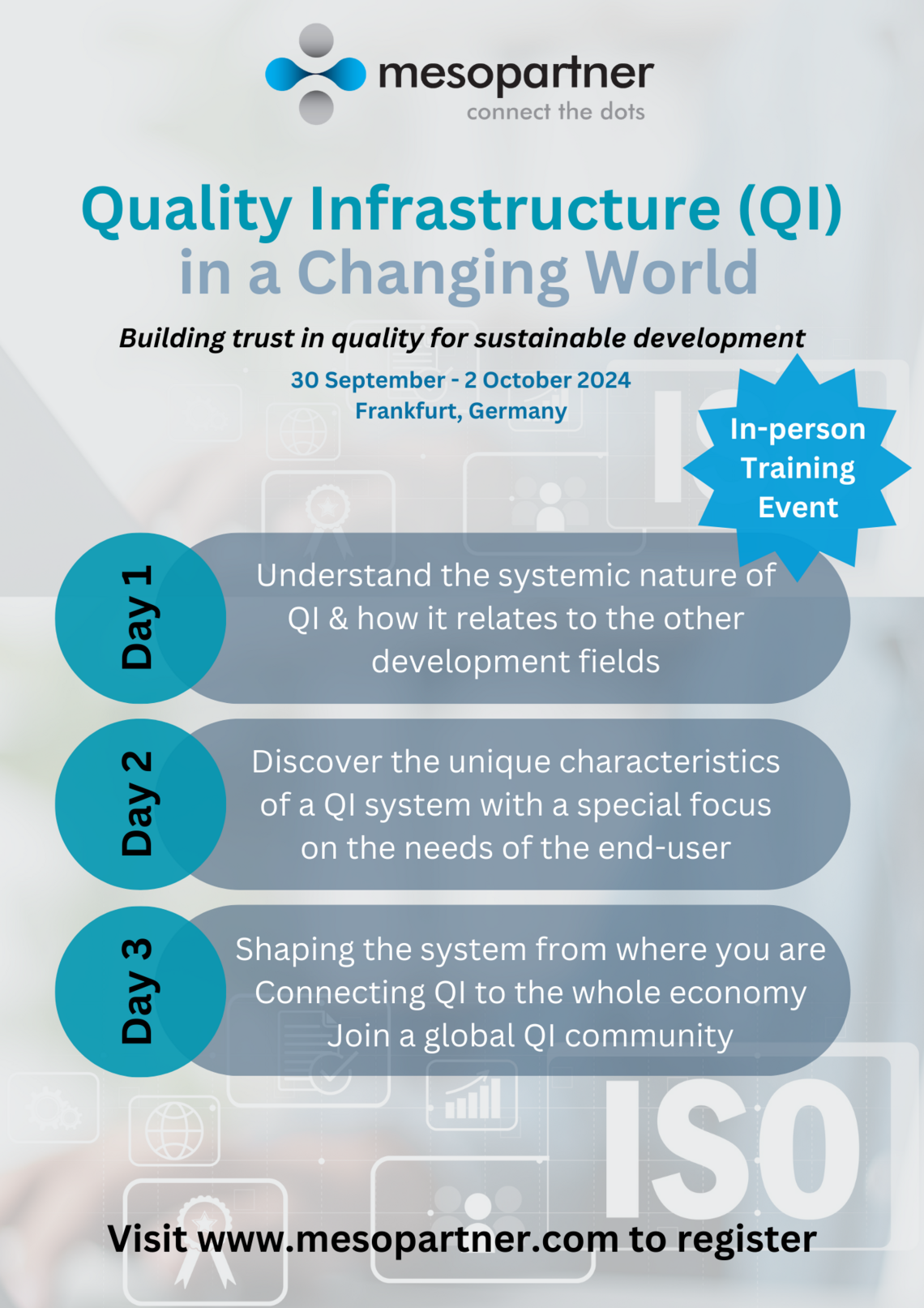Quality Infrastructure in a Changing World
A 3-Day Training for International Organisations, Business Associations, Consultants and Policymakers
This training will cover the relevance of quality infrastructure in the context of various global development topics, including trade, innovation, sustainability, and digitalisation. The training will focus on demand-driven QI development.
The training will examine changes in global trade and explore the role of metrology, standardisation, accreditation, conformity assessment, technical regulations, and market surveillance in promoting sustainable and inclusive development. Special attention will be given to the opportunities and challenges of emerging and developing economies.
The target audience for this training is the staff of international organisations, development consultants and policymakers in trade and economic development. The training will give participants the knowledge and skills to analyse and promote quality infrastructure systems.
Overall, the training aims to equip participants with the tools and strategies needed to make a difference in sustainable development through investments in quality infrastructure.
ABOUT THE TRAINERS
The trainers are partners of Mesopartner, a leading consultancy in systemic competitiveness and sustainable development. Mesopartner works within the framework of international development cooperation for the leading support organisations, programmes, and projects focusing on quality and standards (including PTB, ITC, ILO, UNIDO and the World Bank). The relevant consulting experience includes analysing national quality infrastructure systems, designing national quality policies and assessing quality requirements in value chains in a participatory way.

Dr Ulrich Harmes-Liedtke is an economist with a PhD in economics and political science. He is a researcher and expert on quality infrastructure and sustainable development and a founding partner of Mesopartner ParG
(Germany).
Since 2004, he has been providing consultancy services to quality infrastructure actors in many African, Asian, Latin American, and Caribbean countries on behalf of German and international cooperation institutions (PTB, GIZ, ITC, UNIDO, and the World Bank). Within this framework, Dr Ulrich advises governments on national quality policies. He also co-developed the Calidena method, a gap analysis for quality infrastructure services in value chains.
Dr Ulrich is a visiting researcher and lecturer at the Technical University in Berlin and promotes the Global Quality Infrastructure Index (GQII). He is dedicated to creating content with an academic and scientific focus and regularly shares his knowledge on the blog QI4D.

Christian Schoen. Christian has 30 years of experience in Local and Regional Economy Development, Value Chain Development, Economic Governance and Quality Infrastructure. He has been involved in designing, implementing, monitoring and evaluating economic development projects in Europe, Africa and Asia for various development organisations and donors. Christian has worked as an intermittent team leader for different development programs in Vietnam and Nepal and has built the capacity of international and national consultants, national project staff and counterparts all over Southeast Asia and South Asia during the last 20 years. Christian has been based in Hanoi, Vietnam, since 2008.

Dr Shawn Cunningham. Shawn is a process consultant working in the field of performance and competitiveness improvement of the private sector. He has conducted diagnoses in various industries in more than a dozen countries. His qualifications are mainly in strategic, innovation and technology management, and organizational development, and he has published on topics related to economic development and innovation. He is involved in research into complexity thinking applied to decision making, innovation support and industrialization with different universities.



Date: 30 September - 2 October 2024
Location: mainhaus Stadthotel Frankfurt, Germany
Participation fee: 1,600 euros per person
Group fee: 1,400 euros per person (minimum of 3 participants)
All fees includes 19% VAT
The fees that you pay will cover your participation in the training session, as well as snacks, lunches, and one group dinner on Tuesday, 1 October. However, please note that the fees do not include any expenses related to travel, accommodation, breakfast, or dinner.
If you wish to stay at the mainhaus Stadthotel in Frankfurt, kindly mention it on your registration form. We will reserve your accommodation for you, and you can make the payment directly to the hotel.
Complete the online registration form
Deadline for registration is 2 September
Small print
Payment procedure
- You will receive an electronic invoice by email.
- The first instalment is due within ten days of the invoice date.
- All invoices for the full tuition fee are to be paid in full by 1 August 2024.
Refund policy
If you cancel your participation, the following refund policy applies:
- If you cancel before 1 August 2024, 20% of your payment will be reimbursed.
- If you cancel after 1 August 2024, your payment will not be reimbursed.

If you are an experienced economic development practitioner, consider joining our Annual Summer Academy on Local Economic Development in Berlin.


